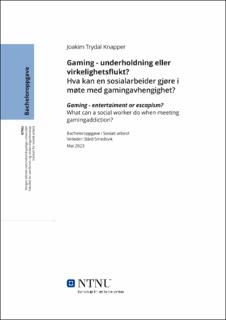Gaming - underholdning eller virkelighetsflukt? Hva kan en sosialarbeider gjøre i møte med gamingavhengighet?
Bachelor thesis
Permanent lenke
https://hdl.handle.net/11250/3073801Utgivelsesdato
2023Metadata
Vis full innførselSamlinger
- Institutt for sosialt arbeid [1291]
Sammendrag
Videospill kan representere mye forskjellig. For noen kan gaming være underholdning, en måte å koble av på i en ellers stressende hverdag, og et sted man holder kontakten med fjerne venner. For andre kan gaming være en destruktiv avhengighetsatferd som får negative konsekvenser for den vanlige hverdag. I denne oppgaven skal jeg se på hvordan sosialarbeidere kan møte og håndtere gamingavhengighet gjennom Foucaults teori om institusjonell maktbruk, samt individuell empowerment-teori i lys av Freire. Disse teoriene fungerer som ulike perspektiver for hvordan sosialarbeideren kan forstå gamingavhengighet. I tillegg presenteres motiverende intervju (MI) som et virkemiddel for å håndtere avhengighetsproblematikken.
Jeg har avgrenset denne oppgaven i en kontekst innen NAV, selv om det er mulig å argumentere for at sosialt arbeid i møte med gamingavhengighet kan forekomme på langt flere områder. En utfordring er at vitenskapelig litteratur med videospill som tema er hovedsakelig basert på individuelle psykologiske fenomener som depresjon og angst. Derfor er denne oppgaven supplert med vitenskapelig litteratur som omhandler NAVs arbeid rundt sosialt utenforskap. På en slik måte blir denne oppgavens virksomhetsområde å sammenfatte disse to innfallsvinklene gjennom teori om makt og empowerment, samt samtalemetodikken motiverende intervju. Videogames can be represented in different ways. For some, gaming constitutes entertainment, a way to relax during stressful days, and a place to keep in touch with distant friends. For others gaming can be a destructive addiction that negatively affects regular everyday life. In this bachelor thesis I explore how social workers can meet and deal with gamingaddiction through Foucault's theory about institutional power, and individual empowerment-theory as explained by Freire. These theories represent different perspectives on which a social worker can understand gamingaddication, while motivational interviewing (MI) is presented as a tool that can be used to deal with the phenomena.
This thesis is limited to a context of the Norwegian Labour and Welfare Administration (NAV), even though there is an argument to be made that social work with gamingaddiction happens in a lot of different areas as well. One challenge regarding the scientific literature is that the theme videogames is mainly based on phenomena of individual phycology like depression and anxiety. This is why this thesis is supplied with scientific literature about social exclusion and how NAV works with this problem. It is an objective of this thesis to merge these two points of interest through theory of power and empowerment, as well as the conversation methodology motivational interviewing.
